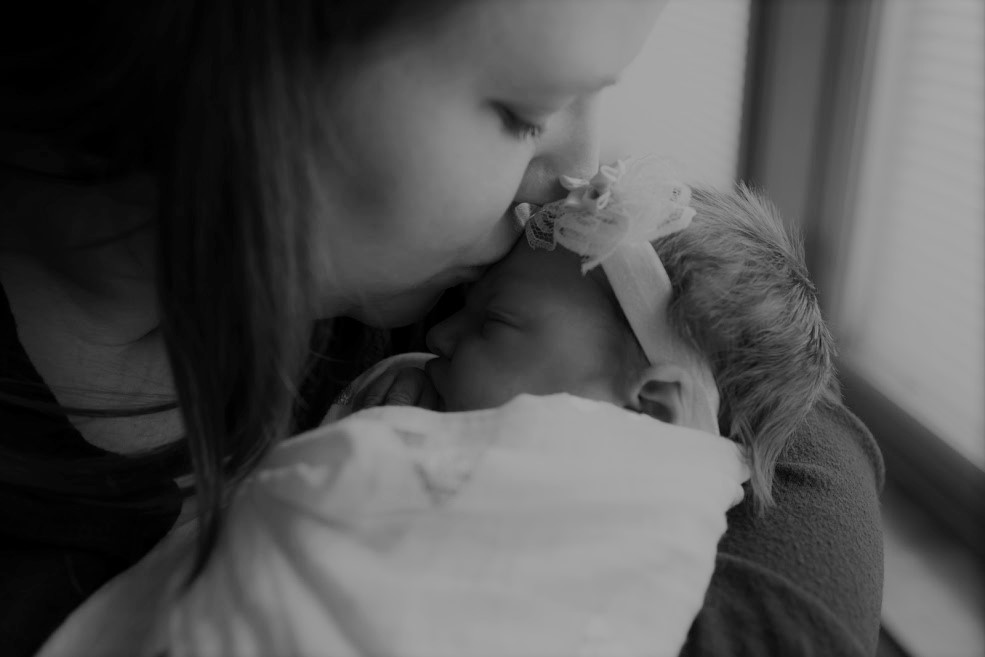Can I tell you a secret? Listen up because you need to hear this. The most educated, attentive, and loving mothers can experience postpartum depression. Did you get that? The ones who live and breathe infants and toddlers, those who prayed to get pregnant, the ones with child development degrees and countless hours of training in attachment…they can still experience postpartum depression. If you are feeling overwhelmed by motherhood, questioning why you struggle so much to enjoy every moment with your little one, I want you to know you are not alone.
My Experience

After my first baby, I remember the anxiety beginning our first night in the hospital. Soon after dozing off to sleep I would wake in a panic and reach out to touch my newborn, worried beyond belief that she might have stopped breathing. I remember holding her with tears streaming down my face, my chest scratched raw from working to get her latched, and feeling like a failure.
I had constant bouts of negative self talk convincing me I must be a “bad mom” for handing my daughter over to my husband while exclaiming I needed a break. The instant I handed her off, I would feel the weight of guilt and demand her back, in tears, apologizing to her, and again feeling awful for admitting I couldn’t handle that moment. I told myself if things got worse, I would get help. Despite recognizing the signs with my first baby, I did not actively seek help for my postpartum depression. I had convinced myself I could manage it on my own. We made it through, but I wish I had sought out the support.
The delivery of baby number two and the surrounding time was difficult. Baby ended up requiring a week long NICU stay. My father then passed away three weeks after her birth. The negative self talk returned and my anxiety was at an all time high. I was struggling with leaving the house, not responding to friends and family, and the motivation to take care of myself was slowly dwindling. Sometimes when my baby was fussy I would feel angry and overwhelmed.
I knew that I was experiencing more than baby blues and grief and began to see a therapist. I waited until my six week check-up to explore if I needed medication. It took me eight weeks postpartum to begin medication to treat my symptoms, but I am so glad I did. Deciding to seek help has been the best decision and I am so thankful for a good therapist and medication to help me begin to feel like myself again.
Seeking Help

As a parent, coach, and early childhood educator, I know how important it is for every mom to take care of their own mental health. Although there are some common traits, every woman’s experience with postpartum depression varies. Some might feel weepy or unmotivated, others might feel highly anxious. There are some moms who experience anger. I love babies and children in general; it is the reason I work in early intervention. I love my own babies fiercely. Having postpartum depression has nothing to do with your love for your baby and it doesn’t mean you are ungrateful for the gift of motherhood. The stigma surrounding postpartum depression needs to be erased. It is my hope that those of you who are struggling have access to and seek out support. Here are my tips to begin your journey to healing.
Have the Conversation
Be an advocate for yourself. If you are even remotely wondering about the possibility that you might have postpartum depression, address it with your physician. Your OB or your primary care physician will be able to to help you. Seek counsel from whichever one you feel most comfortable with. Present your symptoms in the same way you would share about other illnesses. You will likely be asked to fill out the Edinburgh Postnatal Depression Scale at your six week postpartum check up. Fill this out as honestly as possible. If you experience symptoms earlier or later than six weeks, ask to meet with your physician as soon as possible. Your doctor can help you figure out if you are a candidate for medication and what might be the best fit. Even after beginning on medication, if the dosage or medication don’t feel right, speak up!
Set Yourself Up with the Right Therapist
Try and seek out a therapist or counselor who is specifically trained to manage postpartum depression. Buzz words to look for in their qualifications include perinatal mood disorders, infant mental health, women’s issues, and maternal health. My infant joined me in therapy sessions which consequently made the time commitment easier to manage. Many practices now offer tele-therapy which could allow you to receive therapy from the comfort of your own home. First, try out a therapist for a session or two and make sure you feel like it is a good fit. Then, if they don’t seem like the right person for you, try another clinician.
Here are a few local practices that offer therapy for mothers experiencing postpartum depression or perinatal mood disorders:
- Therapy Today | East Lansing, 517-481-213
- Brighter Health Counseling | Okemos, 517-243-9738
- Perspectives Therapy Services | Lansing and Brighton, 810-494-7180
- Community Mental Health Authority of Clinton, Eaton, and Ingham Counties | 517-346-8318
Develop and Nurture Relationships with Other Moms
One of the most healing things for me after becoming a new mom was to attend a free local breastfeeding support group. Every single mother I met there seemed to understand when I broke down sobbing at my first meeting. They were vulnerable, welcoming, and fully supportive of expressing the real and raw side of mothering. I met one of my best mom friends there who has been a constant support ever since. Maybe a new group isn’t for you, but find at least one or two people to support you.
If you are seeking out new mom friends, here are a few Lansing-based groups to get you started.
- Lansing Mom Community + Conversation
- Lansing Mom Preschool Playdate Group
- Ingham ISD Play and Learn groups
- Capital Area Baby Cafe
- WillowTree (including Shades of Motherhood- Perinatal Mood and Anxiety Support and Newborn Group) or see here for upcoming events.
Be Kind to Yourself

Most importantly, offer yourself grace as you wade through postpartum depression. Your brain and your body has changed immensely as you entered motherhood. Certainly it will change again as you parent two children, and again with more. All mothers need time to adjust and some of us need extra support to manage the brain and hormone changes. Speaking aloud that mothering is overwhelming at times, and needing help, does not mean you are failing. Having days where the parenting you are able to give is just “good enough” IS good enough. You are not alone mama, you did not expect to feel this way. I can assure you, you are strong enough to seek out help and you are not alone in needing it. Put in the work to take care of yourself, and the joy and connection will come. I promise, it’s worth it.










